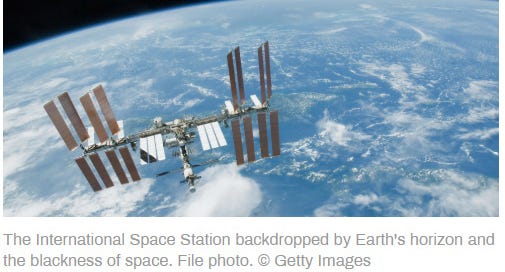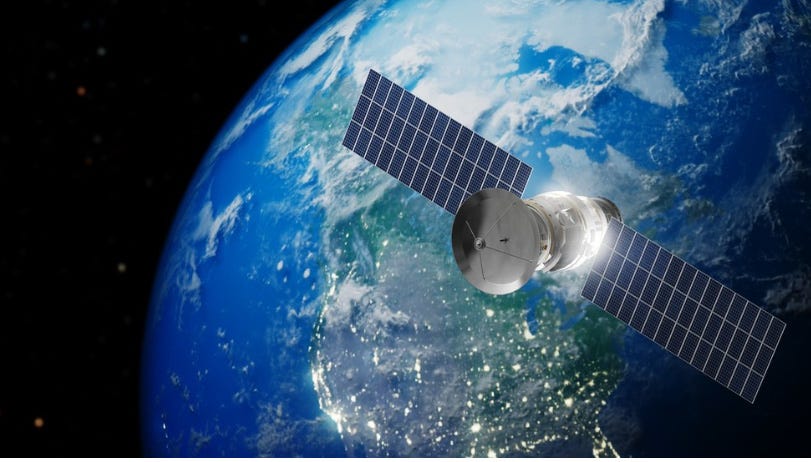US plans to end International Space Station before 2030
US Space Force Publishes ‘Warfighting Framework’ To Train and Prepare Leadership and Troops for Establishing Military Dominance in Outer Space
By RT
May 7, 2025
The US government has confirmed it will begin winding down operations on the International Space Station (ISS), with the goal of retiring the orbiting lab by 2030.
The decision is included in the White House’s Fiscal Year 2026 Discretionary Budget Request released on Friday.
NASA first detailed the plan to decommission the ISS in December 2021.
This was reiterated in follow-up documents published in early 2022.
According to the new document, “The Budget reflects the upcoming transition to a more cost-effective commercial approach to human activities in space as the space station approaches the end of its life cycle.”
The 2026 budget request would allocate around $18.6 billion to NASA, down from $24.9 billion in fiscal year 2024, with deep cuts to science programs.
The Trump administration stated that crewed and cargo missions to the ISS would be significantly reduced during the transition period.
Remaining onboard research will focus on long-duration spaceflight studies crucial to upcoming Moon and Mars missions – efforts that are strongly backed by US President Donald Trump and SpaceX founder Elon Musk.
NASA is expected to rely more heavily on the private sector to maintain a US presence in low Earth orbit.
The budget request says the agency will replace the ISS with “commercial space stations,” which will gradually take over operations previously handled by the aging government-owned facility.
The ISS was launched in 1998 as a joint effort involving the US, Russia, Germany, France, Italy, Japan, Canada, and other countries.
The project began with the launch of Russia’s Zarya module in November 1998, followed by NASA’s Unity module delivered by the Space Shuttle Endeavour in December that year.
Since then, the ISS has hosted astronauts from over a dozen nations and supported thousands of science experiments.
Russia’s space agency, Roscosmos, previously raised doubts about extending ISS operations until 2030.
In July 2022, then-Roscosmos head Yury Borisov announced that Russia would leave the ISS program after 2024 and begin building its own Russian Orbital Station (ROS).
In 2024, Borisov approved a master schedule for constructing the ROS through 2033, though he later clarified that Russia’s exact exit date would depend on the condition of the ISS.
Five Eyes is now getting sensitive space intel
The US has reportedly shared data with the UK and other group members, citing alleged off-planet Chinese and Russian threats
The US has begun sharing its “most sensitive” military intelligence on China’s and Russia’s space operations with the UK and other members of The Five Eyes (FVEY) global intelligence group, The Times has reported, citing a senior commander within the US Space Force.
Until this month, the work of Space Delta 9, a unit focused on America’s orbital warfare, was largely meant only for US officials with top-secret security clearance.
However, in a move that a Space Delta 9 spokesman described to The Times as “momentous,” British military chiefs have been allowed to observe operations at the unit's base in Colorado.
The other Five Eyes members, Australia, New Zealand and Canada, have also been allowed access to the highest levels of US space intelligence, the British daily reported on Wednesday.
The Times attributed the development to Beijing and Moscow allegedly developing “new space capabilities,” such as dual use satellites, and orbiters designed for both civilian and military applications.
”We have to be ready for that fight that nobody wants to have,” Colonel Ramsey Horn, commander of Space Delta 9, told the paper. He went on to claim that the unit is “more ready” than ever to engage in combat in space.
The US Defense Department has accused China of stockpiling anti-satellite weapons, raising concerns over what it describes as Beijing’s increasing emphasis on space warfare.
Chinese officials have rejected the claims and argued that militarization of space by the US poses the real threat to global stability.
Washington has made similar allegations against Russia, suggesting that Moscow may possess covert anti-satellite systems, potentially with nuclear capabilities.
The Kremlin has dismissed the claims as baseless attempts to deflect attention from America’s own military ambitions in space.
Both Russia and China have consistently stated their opposition to the weaponization of space and have advocated for keeping space a domain reserved for peaceful use.
READ MORE:
Draco Aliens Helped Nazis to Destroy Humans, Nordics Helped US To Start Apollo Program
The Warning: What One Russian Satellite Tells Us About the Future of Nuclear Warfare
NEW REPORT TO CONGRESS SHOWS US DETERMINED TO MILITARIZE SPACE
Share or comment on this article.
Your support is crucial in exposing fake news and in helping us defeat mass censorship.






Trusting other countries with the United States gathered intelligence is a mistake. The U.S. can't even trust it's own House of Representatives. Clean our own House first!